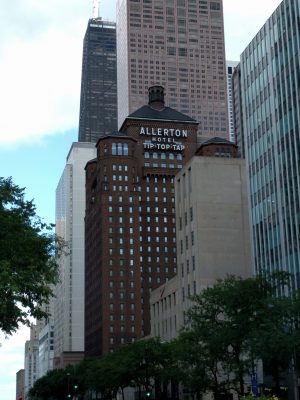
The Warwick-Allerton Hotel, circa 2017 (from the south along Michigan Ave).
Molly Worthen and I began discussing this potential roundtable and topic shortly after the 2017 S-USIH conference in Dallas. I approached her with the conviction that no gathering on American anti-intellectualism could occur without some consideration of religion, and Christianity in particular. Indeed, in the prior works of Richard Hofstadter, Susan Jacoby, and most recently Kurt Andersen, Evangelical Christianity figures prominently as a factor behind larger currents of anti-intellectualism, ignorance, and unreason.
When I asked Molly if she would like to lead a panel on the topic, she agreed immediately. Given her authorship of the award-winning, widely-reviewed, and well-received Apostles of Reason, published in 2013, and her friendship to S-USIH, she was a logical first choice.
I asked Worthen how she would describe the roundtable. Here’s her jaunty response: “We all know that some scholars and public intellectuals tread winsomely as angels, and others are clearly handmaids of the devil. How have Christians across a range of traditions grappled with the tensions between traditional religion and modern intellectual inquiry? This roundtable plenary will ponder American Christianity’s complex relationship with the life of the mind–and its consequences for culture and politics.”
Here are the other distinguished participants:
- Martin Marty – Fairfax M. Cone Distinguished Service Professor Emeritus of the History of Modern Christianity, University of Chicago Divinity School;
- Mark Noll – Research Professor of History, Regent College and Notre Dame Emeritus Francis A. McAnaney Professor of History;
- Maura Farrelly – Associate Professor of American Studies, Brandeis University; and, last but not least,
- Curtis J. Evans – Associate Professor of American Religions and the History of Christianity, University of Chicago Divinity School
This plenary takes place after dinner on Friday, November 9, 2018. We’ll see you there! – TL

2 Thoughts on this Post
S-USIH Comment Policy
We ask that those who participate in the discussions generated in the Comments section do so with the same decorum as they would in any other academic setting or context. Since the USIH bloggers write under our real names, we would prefer that our commenters also identify themselves by their real name. As our primary goal is to stimulate and engage in fruitful and productive discussion, ad hominem attacks (personal or professional), unnecessary insults, and/or mean-spiritedness have no place in the USIH Blog’s Comments section. Therefore, we reserve the right to remove any comments that contain any of the above and/or are not intended to further the discussion of the topic of the post. We welcome suggestions for corrections to any of our posts. As the official blog of the Society of US Intellectual History, we hope to foster a diverse community of scholars and readers who engage with one another in discussions of US intellectual history, broadly understood.
Tim, what a fantastic plenary. Thanks so much for putting this together. In terms of the relationship — whatever it may be! — between American Christianity and American anti-intellectualism, I have some skin in the game (and I suppose I’ve hedged my bets too, by chance or choice). But I have a lot of company in that regard. And whether or not historians have any personal stakes in this topic, those of us who teach in the Bible belt encounter some of these tensions in the classroom and in our neighborhoods. I’m really excited about this panel — congrats on pulling this together. Conference looks great.
Thanks Lora. I provided a few thoughts, but Molly did this mostly on her own. She deserves the credit. I’ll be counting on the audience to pull at threads the panelists miss. – TL